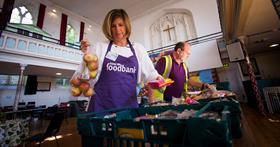
Giving platformNeighbourly has put out a call inviting charities, food projects, schools and community groups to join its free food surplus redistribution scheme.
Neighbourly is the redistribution partner to retailers and manufacturers including Lidl, Marks & Spencer and Danone. Through the platform the equivalent of more than seven million meals has been distributed to over 1,500 charities and community projects in local communities across the UK and Ireland.
Now Neighbourly, which is completely free to use, is extending the scheme to more communities whose residents and families are suffering from food poverty and insecurity.
The latestresearchfrom WRAP shows that food redistribution from commercial sources (retailers, manufacturers and hospitality and food services businesses) has increased by 50 per cent in just two years, however there is potential for increased redistribution.
One of the things needed for this to happen, according to Neighbourly, is for more charities to become aware that redistributed food is available to them so that they join up to the scheme.
Neighbourly’s own research – from surveying its food surplus recipients – shows just how important receiving surplus food is to charities. On average, organisations reported that they save an estimated average of £161 a month through these food donations, with 90 per cent finding the Neighbourly food surplus schemes ‘beneficial’ or ‘extremely beneficial’.
Surplus food available for daily collection through the Neighbourly platform includes fruit and veg, bakery products and ambient food, which can be safely stored at room temperature in a sealed container.
It is also possible for charities to collect chilled items from some stores. This includes dairy, meat, fish, chilled drinks and packaged ready meals, as long as they can meet certain criteria for safe collection, transportation and storage of chilled goods.
“While the Neighbourly platform has distributed the equivalent of more than seven million meals over the past three years, it’s imperative that we keep building knowledge across the sector that this valuable resource is available,” Neighbourly’s founder Nick Davies said.
“We invite charities of all shapes and sizes to join, from small community groups right through to larger charity networks, who in particular are able to put chilled items to good use. So much of the food surplus supply chain is as yet untapped.”
To sign up to receive surplus food, charities and not-for-profits can register on theNeighbourly websiteoremailfood@neighbourly.com. Groups must have a food hygiene certificate in order to collect the surplus.



